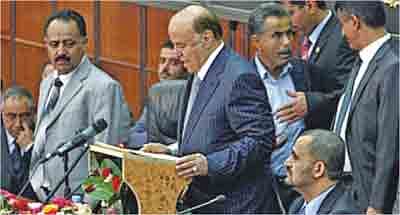Yemen under new leadership: Hopes and fears

Photo: AFP
Abed Rabu Mansour Hadi, the newly elected president of Yemen, has stepped into a new chapter of Yemen's history. Through a peaceful election, he replaced the 33 years rule of President Saleh. Definitely it is a good sign towards a democratic transition of the country, but the country has to do a lot of hard works to realise people's dream for change. Yemen is one of the poorest countries in the Arab world as well as a haven for Islamic jihadists; al-Qaeda is very active in this country. So the Yemeni administration has to leap over severe economic, humanitarian as well as security hurdles to build a stable and developed Yemen.
It is hopeful that the new president of Yemen has come to power through a democratic election; he got 99.6 percent of the vote .At the same token it is a matter of fear that the new democracy lacks competitive opposition. Besides, as being the former vice president of Mr. Saleh, it would be difficult for Mr. Hadi to continue independently because Mr. Saleh still wields considerable influence in Yemen and his relatives control most of the military and government security agencies. The recent experience of toppling down of Maldives president shows that dethroning of such autocratic reminiscent is an important part of democratisation.
One of the most significant issues in Yemen is wide discrimination between traditionalist Northern and marxist Southern Yemen even though they have been unified since 1990 after years of bloody border wars and skirmishes. Since unification Yemen has been modernizing and opening up to the world, but southerners still feel discriminated and marginalised; Saleh government conspicuously maintained this discrimination. Although Mr. Hadi is from the southern province of Abyan, he fled to Sana in the 1980s and is seen as a traitor by many in the south. So Mr. Hadi should be much more careful regarding this matter. He has to be neutral.
Combating al-Qaeda is another great challenge to the new president of Yemen. The country came under limelight at the end of 2009, after crackdowns on al-Qaeda-linked militancy in Afghanistan and Pakistan raised concern that militants had moved to Yemen for shelter. Last week, a General was abducted by al-Qaeda in retaliation of government attack on military stronghold of al-Qaeda in Southern Yemen. The new government in Yemen is partnering with the United States in a striving plan to patch up its military to combat al-Qaeda franchise that has exploited the political turmoil to seize control of large swaths of the country's south. "One of the most prominent tasks is the continuation of war against al-Qaeda as a religious and national duty," the newly elected president vowed in his inaugural speech. According to the State Department figures the United States has allocated $53.8 million in security assistance for Yemen this year, a significant increase from $30.1 million last year. It has been ensured by the American official Mr. Brennan that the US administration would slowly start resuming security aid to Yemen that was suspended in 2011. At the same time, the administration will work with Saudi Arabia and other Persian Gulf allies to train and equip Yemeni security forces to counter al-Qaeda's wider threat to destabilize Yemen.
Yemeni people have given their full support to President Hadi ; now, he have to act upon their will or face the same fate of Saleh!
The writer is a Programme Officer, UGC-HEQEP on Teaching and Learning in International Relations (TLIR), Dept. of International Relations, University of Dhaka.

 For all latest news, follow The Daily Star's Google News channel.
For all latest news, follow The Daily Star's Google News channel. 



Comments